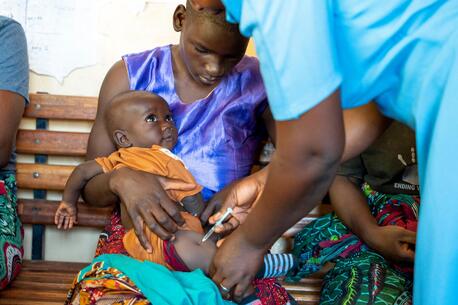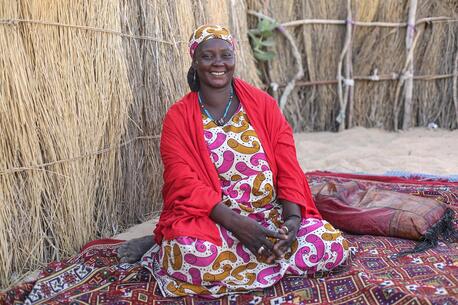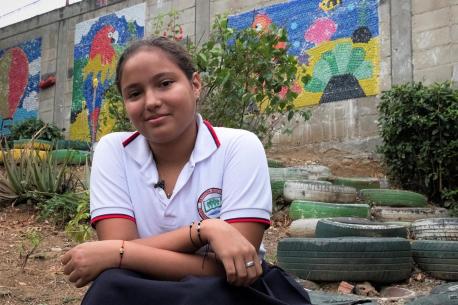
It Takes a Village: Partnerships Ensure Quality Inclusive Education in Colombia
A high-level mission to Colombia shines a spotlight on the power of education and joint programming with UNICEF and other ECW strategic partners for crisis-affected migrant, refugee and host-community children.
“¡Bienvenidos!” UNICEF facilitators call out as refugee and migrant parents from Venezuela enter the bright yellow and blue Points of Information and Orientation (PIO) center in Cúcuta, Colombia, with their young children.
It’s a joyous space, filled with art, music, laughter and hope. Some mothers hold their young children to their chests as they bounce up and down to the beat of the music, while other girls and boys dance and clap on their own.
Aside from facilitating bonding activities between children and their guardians, PIOs — Puntos de Información y Orientación in Spanish — ensure protective spaces for migrant families, promote early childhood development and learning, offer critical psychosocial support, and provide nutritional assessments.
Just as important, this center is bringing joy and a sense of security back into the lives of children who have experienced immense instability, violence and loss. By the time families leave the PIO space, children are smiling and mothers walk away with important life-skills resources in hand and a spring in their step.
The UNICEF PIO center in the border town of Cúcuta is just one example of the holistic education programs reaching Venezuelan and other vulnerable children and youth in Colombia with funding from Education Cannot Wait (ECW), the United Nations global fund for education in emergencies. ECW’s partners —UNICEF, Save the Children, the Norwegian Refugee Council, World Vision, Plan International and other local organizations — are working with the Government of Colombia to ensure girls and boys impacted by Colombia’s complex and interconnected challenges are afforded their right to education.
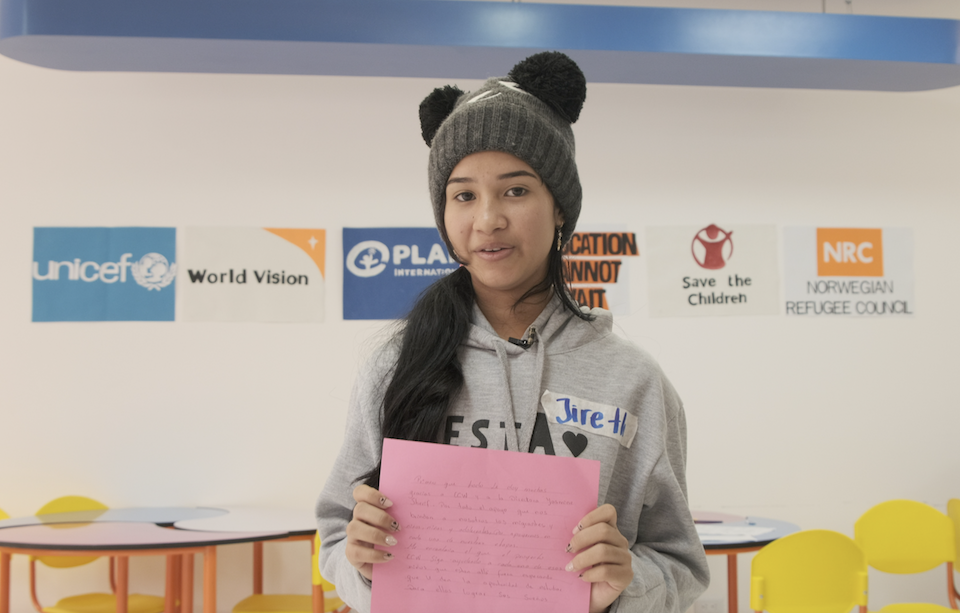
A love of learning
During a recent high-level mission in Colombia led by ECW Executive Director Yasmine Sherif, strategic partners including UNICEF visited ECW-supported schools and education centers in Cúcuta, meeting with refugee girls who are defying the odds to find a quality education in Colombia after leaving their homes in Venezuela.
Girls like 15-year-old Jireth, who dreams of one day of becoming a forensic scientist or veterinarian.
“I’d like to thank all of the organizations for the support they’ve given us migrants — girls, boys and adolescents. And for supporting us in each stage of our lives. I would love for ECW’s program to continue helping each one of those children who are out there, waiting for a chance to fulfill their studies so they can make their dreams come true,” says Jireth.
Jireth is supported by Plan International, which like UNICEF, is one of the five organizations partnering with ECW in Colombia. Through ECW investments in Colombia, all work is delivered through a collaborative approach. It’s a true testament to the UN’s New Way of Working, localization through the Grand Bargain Agreement, and concerted efforts on the part of the Government of Colombia to deliver on the Sustainable Development Goals.
“It’s rewarding to come back and see results on the ground and implementing partners working hand-in-hand across the humanitarian-development-peace nexus. UNICEF is doing tremendous work to ensure safe, inclusive equitable education reaches the most marginalized children in the country. There is nothing more beautiful than witnessing the impact of this joint-programming — especially seeing refugees and migrants, indigenous children, adolescent girls and children with disabilities in school and learning,” says Sherif.
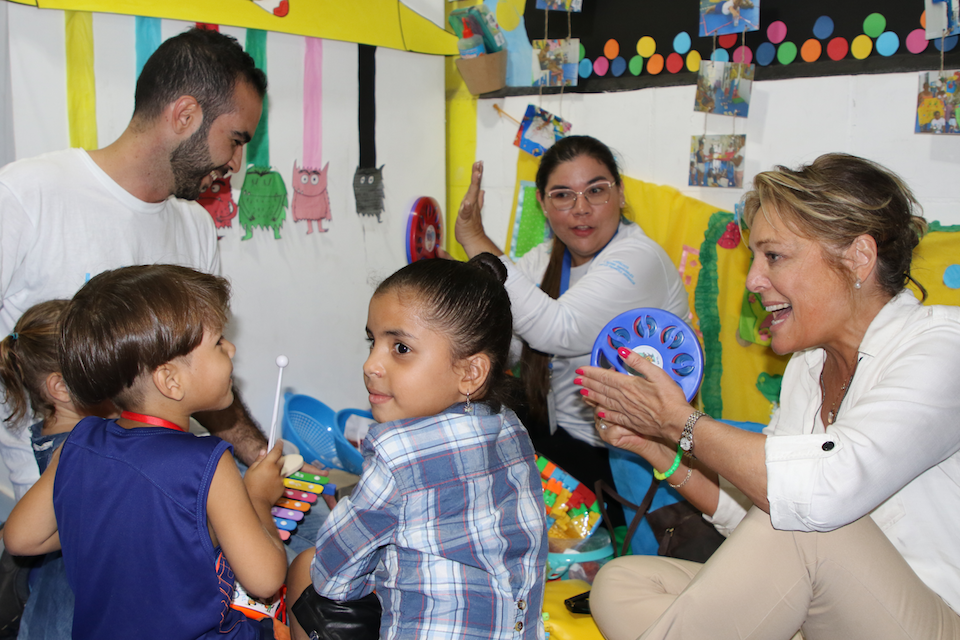
Responding to a massive refugee crisis
Jireth is just one of the countless children who have entered Colombia in search of safety and stability. The Venezuela regional crisis has triggered the second largest refugee crisis in the world today. In all, Colombia is now home to 2.5 million Venezuelan refugees and migrants — the second largest refugee population after Türkiye. While recent years have seen progress in building a lasting peace, economic progress and increased stability, Colombia also has a total of 5.6 million internally displaced people. Indigenous and Afro-Colombian peoples, girls and children with disabilities are also often left behind.
While the Government of Colombia has taken admirable steps in extending temporary protection status to Venezuelans in the country, facilitating the access of over half a million among them to the national education system and signing on to the Safe Schools Declaration, there is much left to do. The drop-out rate in Colombia is especially concerning. While just 3.62 percent of Colombians end up leaving school, the figure nearly doubles for Venezuelans and reaches a troubling 17 percent for internally displaced children.
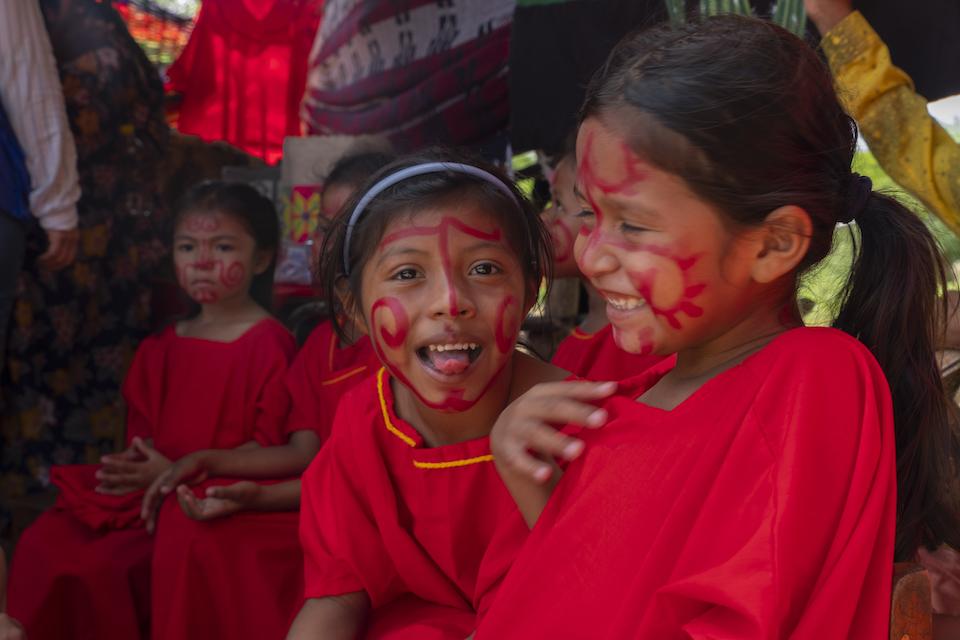
Building stronger together
The ECW-funded multi-year programming in Colombia — implemented by a consortium of NGOs led by UNICEF and Save The Children — reflects the Fund’s whole-of-child approach in reaching the country’s most marginalized children. This means tailored responses that address access to quality learning environments, mental health and psychosocial support, disability inclusion, teacher training and more. Through this holistic response, over 100,000 marginalized children have already received support. During the mission, Sherif announced ECW’s intention to further extend Colombia’s successful Multi-Year Resilience Program.
“Multi-year programs in places like Colombia are one of the best investments we can make in ensuring universal human rights,” says Sherif. “This means girls and boys like Josveglys, Isabella and Yermino will be able to continue on to complete their primary and secondary education, that indigenous girls and boys will receive the inclusive quality education that is their right, that children with disabilities will be able to join their peers in the classroom, and that young refugees like Jireth can continue their studies and see their dreams come true.”
“We cannot do it alone. ECW’s current multi-year program requires an additional $46 million to reach its target in 2023. We urge donors, the private sector and people worldwide to join ECW, UNICEF and our diverse group of global strategic partners in delivering on our promise of universal, inclusive, quality education for all,” says Sherif. “In Colombia — and in nations worldwide impacted by crisis, displacement and conflict — this is the single best investment we can make today in ensuring a better future for generations to come.”
UNICEF works all over the world to help children get a quality education. Your contribution can make a difference. Please donate.

